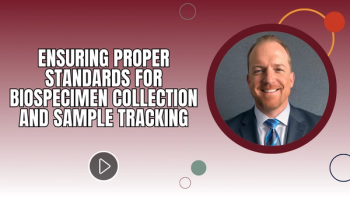
In this video interview, Jane Myles, program director, Decentralized Trials & Research Alliance (DTRA), shares her most important takeaways from the event including how industry is becoming more and more ready to adopt decentralized elements.

In this video interview, Jane Myles, program director, Decentralized Trials & Research Alliance (DTRA), shares her most important takeaways from the event including how industry is becoming more and more ready to adopt decentralized elements.

In this video interview, Jane Myles, program director, Decentralized Trials & Research Alliance (DTRA), discusses how some stakeholders view DCTs only as fully remote trials.

In this video interview, Mark Melton, vice president of biospecimen data and operations, Slope, talks secure data transfer and risk mitigation.

Interim results from the lead-in cohort showed some patients who received LP-300 alongside chemotherapy experienced an average tumor size reduction of 51%.

In this video interview, Mark Melton, vice president of biospecimen data and operations, Slope, touches on the challenges with hand-written data collection and how they can be addressed with AI.

Palmese, executive director, site relationships and DCT solutions, discusses the practice of incorporating decentralized elements in a study rather than planning a decentralized trial from the start.

Industry experts discuss the use of decentralized technologies and the potential of artificial intelligence in reaching underrepresented patient populations.

In this video interview, Mark Melton, vice president of biospecimen data and operations, Slope, discusses how AI can be used to streamline sample collection and tracking.

Our November issue focused on patient centricity with additional coverage around data management.

In this video interview, Jeff Sidell, PhD, chief technology officer, Advarra, highlights the idea of consolidating clinical technology and how it may become more popular in the future.

In this video interview, Jeff Sidell, PhD, chief technology officer, Advarra, discusses the concept of data exhaust and how managing it can be simplified with artificial intelligence.

The PANOVA-3 study met its primary endpoint, demonstrating an improvement in overall survival for patients treated with Tumor Treating Fields.

In this video interview, Jeff Sidell, PhD, chief technology officer, Advarra, talks AI and how it can automate repetitive processes.

New solution offers real-time data exchange and inventory control, ensuring sample integrity.

WINREVAIR (sotatercept-csrk) met the study’s primary endpoint of time to first morbidity or mortality event.

In this video interview, Jeff Sidell, PhD, chief technology officer, Advarra, highlights how integration can simplify processes.

Data from the CAPItello-281 trial show Truqap alongside abiraterone and androgen deprivation therapy achieved a statistically significant and clinically meaningful improvement in radiographic progression-free survival.

In this video interview, Jeff Sidell, PhD, chief technology officer, Advarra, discusses how sites are being burdened by increasingly complex technologies.

The kinase inhibitor will be evaluated in patients with newly diagnosed glioblastoma.

In this video interview, Mark Melton, vice president of biospecimen data and operations, Slope, highlights the need for improved management of the sample lifecycle.

Participants touch on the different aspects of FDA's recent Diversity Action Plan guidance and how industry must be held accountable for implementing change.

New paper features insights from nearly 100 experts on four key barriers to clinical trial access.

In this video interview, Mark Melton, vice president of biospecimen data and operations, Slope, talks challenges at the site-level with collection.

Former Chief Oncology Officer and Executive Vice President, Chris Boshoff, MD, PhD, will assume the role and lead all R&D functions including oncology.

In this video interview, Mark Melton, vice president of biospecimen data and operations, Slope, highlights the clinical research industry’s need for more regulation around collecting data.

In this video interview, Mark Melton, vice president of biospecimen data and operations, Slope, discusses how different collection methods are creating complexities.

In this video interview, Kelli Aufderheide, director, laboratory decentralized trial solutions, IQVIA Laboratories, highlights how stakeholders can best support sites throughout complex studies.

In the second part of this roundtable discussion, participants highlight best practices for reaching underrepresented populations and increasing their awareness of clinical trials.

In this video interview, Kelli Aufderheide, director, laboratory decentralized trial solutions, IQVIA Laboratories, discusses the differences between working with local labs and central labs.

Over 200 stakeholders highlighted challenges such as communication, training, and improving technology.